2010山东省菏泽市中考英语真题及答案
注意事项:
1.本试题分第I卷和第II卷两部分。第I卷1-8 页为选择题,75分;第II卷9-12页为
非选择题,45分;共120分。考试用时120分钟。
2.答第I卷前务必将自己的姓名、考号、考试科目及试卷类型涂写在答题卡上。考试
结束后,试题和答题卡一并收回。
3.第I卷每题选出答案后,都必须用2B铅笔把答题卡上对应题目的答案标号(A、B、C
或D)涂黑。如需改动,必须先用橡皮擦干净,再改涂其它答案。
第I卷(选择题 共75分)
一、听力理解(共20小题;每小题1分,满分20分)
做题时,先将答案标在试卷上。录音内容结束后,你将有两分钟的时间将试卷上的答
案转涂到答题卡上。听完每个句子、每段对话或短文后,你都有十秒钟的时间来回答有关
小题和阅读下一小题。
(一)录音中有5个句子,每个句子读一遍,从每小题A, B, C三个选项中,选出能回答录音
中每个问题的正确答案。
1. A. I’m sorry.
B. You’re welcome.
C. The same to you.
2. A. Yes, I have.
B. I’d love to.
C. No, I am not.
3. A. Yes, you can.
B. No, you can’t.
C. I want to buy a jacket.
4. A. I found it at home.
B. I found it myself.
C. I found it yesterday.
5. A. 99 yuan.
B. They were nice.
C. I have no money.
(二) 录音中有5组对话和5个问题,听对话和问题两遍后,从每小题A, B, C三个选项中选
出能回答录音中每个问题的正确答案。
6. What’s the matter with the girl?
A. She’s badly ill.
B. She’s angry with the man.
C. She’ll go to see a doctor herself.
7. What does Mr. White mean?
A. He asks the woman to work hard.
B. He won’t let the woman work for him.
C. The woman doesn’t want to work any more.
8. What’s the man going to do?
A. Ask Mary to mend the TV.
�
B. Ask Mary to turn off the TV.
C. Ask Mary to turn down the TV.
9. Who lives in England?
A. Robert’s uncles.
B. Robert’s parents.
C. Robert’s grandparents.
10. How will Mr. Hunt go to London?
A. By car.
B. By air.
C. By train.
(三)录音中有一段对话和5个问题,听对话和问题两遍后,从每小题A, B, C三个选项中选
出能回答录音中每个问题的正确答案 。
11. What are they going to do?
A. To take a walk.
B. To go to a party.
C. To buy a watch.
12. When did they get to the bus stop?
A. At 6:35.
B. At 6:45.
C. At 7:35.
13. Why hasn’t Rose had her watch?
A. She lost it yesterday.
B. She doesn’t have a watch.
C. The watch doesn’t work well.
14. How long has Rose had her watch?
A. For half a year.
B. For about a month.
C. For three months.
15. How will they go there?
A. On foot.
B. By bus.
C. By taxi.
(四)录音中有一篇短文和5个问题,听短文和问题两遍后,从每小题A, B, C三个选项中选
出能回答录音中每个问题的正确答案。
16. Why are the husband and wife lucky and happy?
A. Because they live in a big house.
B. Because they have a lot of money.
C. Because they have many close friends.
17. What does Jim do?
A. He’s a student.
B. He’s a teacher.
C. He’s a driver.
18. What’s Lucy good at?
A. Drawing.
B. Swimming.
�
C. Playing basketball.
19. Why don’t they see Bob very often?
A. Because Bob is too busy.
B. Because Bob isn’t so friendly.
C. Because Bob lives far away from them.
20. What can we learn from the story?
A. They like to stay home alone.
B. They often have a get-together with their friends.
C. They don’t have much time to meet each other.
二、英语知识运用(共两节,满分25分)
第一节 单项填空(共15小题;每小题1分,满分15分)
从A、B、C、D四个选项中,选出可以填入空白处的最佳选项,并在答题卡上将该项涂
黑。
21. Please pick up the _______. Don’t keep it on the floor.
A. water
C. books
22. —May I have a look at _______ book tonight?
B. paper
—Of course, you can. I have ________ old one at home.
A. the; a
C. the; an
B. a; the
D. bottles
D. the; the
23. Which is the _______ way to Qingdao, by plane, bus or train?
A. good
B. well
C. better
D. best
24. I ________ ride a bike to school. But this morning I took a taxi because I got
up late.
A. never
D. usually
25. I’m sorry, I didn’t _______ you clearly. Would you say it again?
B. sometimes
C. seldom
A. hear
B. notice
C. see
D. watch
26. —Shall we go out for a walk?
—Sorry, I can’t. I _______ my homework.
A. do
B. did
C. am doing
D. was doing
27. Mary spends a lot of money on clothes _______ her family is not rich.
A. because
B. though
C. if
D. so
28. My friend Li Xiao knows my hometown very well because he _______ there many
times with me.
A. has been
B. has gone
C. had gone
D. went
29. We haven’t decided _______ we’ll go to Shanghai next week.
A. where
B. when
C. why
D. how
30. There goes the bell. Hurry up, _______you’ll be late for class.
A. and
B. or
C. so
D. but
31. This is the school _______ I studied three years ago.
A. where
B. when
C. that
D. which
32. — _______ can we get there?
—In five minutes.
A. How often
B. How far
C. How soon
D. How long
33. He never ________ no matter how many difficulties he has.
A. gives up
C. works out
34. —It’s dangerous to swim here. Look at the sign.
B. gives in
D. goes away
�
—Oh, I _______ notice it. Thanks for telling me.
A. haven’t
C. don’t
B. won’t
D. didn’t
35. —Come back quickly, Tom.
—Sure, Mum. _______.
A. Please go ahead
C. I’ll say it again
B. It won’t be long
D. Good idea
第二节 完形填空(共10小题;每小题1分,满分10分)
阅读下面短文,掌握其大意,然后从36~45各题所给的四个选项(A、B、C和D)中,
选出最佳选项,并在答题卡上将该项涂黑。
Mr. Strong is a London taxi driver. The following talk is given by him.
“I have been a taxi driver
nearly ten years. It’s a nice job most
of the time. You meet a lot of people. I always work at night,
there
is too much traffic during the day. I go to work at 5:30 in the afternoon, and I
usually
between 2:00 and 3:00 in the morning.”
36
37
38
39
“Some
things happened late at night.
day I was taking
a woman home from a party. She had her little dog with her. When we got to her house,
she found that she had lost her
she
climbed in through the windows.”
. So I waited in the car
41
42
40
43
“I waited and waited. After half an hour of ringing the bell I decided to find
in
out
through the window. The next thing I knew was that the police came. They thought
I was a thief.”
was going on. I tied the dog to a tree and started to
44
“Luckily the woman came downstairs. She
45
have gone to sleep and
C. before
C. though
B. for
B. so
B. go shopp ing C. do sports
B. good
C. strange
B. Another
forgotten me and the dog!”
36. A. in
37. A. if
38. A. go home
39. A. sad
40. A. The other
Other
41. A. money
42. A. until
43. A. what
44. A. drive
45. A. will
B. bag
B. while
B. which
B. walk
B. can
D. after
D. because
D. do housework
D. disappointing
C. The others
D.
C. box
C. since
C. who
C. climb
C. may
D. key
D. as soon as
D. that
D. run
D. must
三、阅读理解(共15小题;每小题2分,满分40分)
阅读下列短文,从每题所给的四个选项(A、B、C和D)中,选出最佳选项,并在答题
卡上将该项涂黑。
A
Here are some facts about homes in the United States and the people who live
in them. In the early 1990s, about 50% of the Americans owned their homes and the
rest rented (租) their homes. The rented homes were usually apartments (公寓).
74% of the people in the US make their homes in or around cities. 26% live in
�
the country. Dogs live in about 40% of all homes in the US. About half that number
have cats.
Families in the US are becoming smaller. On the average (平均), 2.64 people
lived at home in early 1990s. In 1960, the average was 3.5.
Half of the teenagers in the US have their own bedrooms.
An American moves, on the average, twelve times in his or her life. In Japan
a person moves about five times, and in England a person moves eight times.
46. Most Americans live ________, according to the passage.
A. in or around the cities
B. in cities
C. around cities
D. in the country
47. Ho w many American families own a cat?
A. About 40%.
C. About 74%.
B. About 20%.
D. About 26%.
48. On the average, there were ________ people in an American family in 1994.
A. more than 3
C. le ss than 2
B. only 3.5
D. about 2.64
49. ________ in the US have their own bedrooms.
A. All of the people
B. Most of the children
C. Half of the teenagers
D. Only some of the teenagers
50. What can we learn from the passage?
A. In the early 1990s, most of the Americans owned their homes.
B. Families in the US are becoming bigger and bigger.
C. A Japanese moves more often than an American.
D. An American moves more often than an Englishman.
B
A man was walking along the street when he saw a woman carrying a large box.
It was half in and half out of her car. So the man went up and said, “The box looks
very heavy. Let me give you a hand.”
“That’s very kind of you,” the woman said, “I’m having a lot of trouble
with it. Maybe it sticks (卡住) in the car door.”
“Together we’ll soon move it,” the man said. “I’ll get in and take the
other end.” And he got in the car.
“Right,” the man said. “I’m ready,” and he began to push the box hard.
For several minutes, the man and the woman tried to move the box. Soon they
felt very tired.
They rested for a moment. Then the woman said, “Let’s try again. One, two,
three!” They went on moving the box.
At last, when they were exhausted, the man said, “I’m sorry, but I don’t
think there’s any way to get it out of your car.”
“Get it out?” the woman cried. “I’m trying to get it in! You know?”
51. Where did this story happen?
�
A. At a bank.
C. In the street.
B. In a shop.
D. In the woman’s car.
52. Who got in the car to move the box?
A. The woman.
C. Both of them.
B. The man.
D. Neither of them.
53. The underlined word “exhausted” means “________” in Chinese.
A. 精疲力竭的
C. 充满希望的
B. 激动的
D. 沮丧的
54. Which of the following is TRUE about the story?
A. The man stuck in the car door.
B. The woman asked the man for help.
C. The man refused to help the woman.
D. The woman tried to get the box into the car.
55. What do you think of the man?
A. He is a helpful man.
B. He looks very strong.
C. He is funny and stupid.
D. He likes to play jokes on ot hers.
C
Here is a page from a magazine called Future. Read the following information
about things that may happen in ten years.
Cars will run on solar power (太阳能) and will be much cleaner. They will be
much safer. For example, if you are too close to another car or if you are driving
dangerously, your car will slow down or stop by itself.
New cities will have to be built in the sea. Some cities on water will have
two levels (层). People will live on the upper level; the lower level will be used
for traffic, shops and factories.
Biotechnology (生物技术) will make food better and healthier. Plants without
insects or illnesses (病虫害) will be developed. The taste of fruit and vegetables
will be better and food will be kept longer.
Many new ways to cure (治愈) illnesses will be found. People will use products
of genetic engineering ( 基 因 产 品 ) to cure more illnesses. However, some new
illnesses will appear.
56. What will happen in the future according to the passage?
A. The air won’t be much cleaner.
B. Cars will run by itself without a driver.
C. It’ll be much more dangerous to drive a car.
D. There’ll be fewer accidents and less pollution (污染).
57. Where will new cities have to be built in the future?
A. In the sea.
C. Underground.
B. In the sky.
D. On the land.
58. What will be made better and healthier by biotechnology?
A. Medicine.
B. Toys.
�
C. Food.
D. Clothes.
59. Genetic engineering will help doctors to cure more________.
A. cold
C. cancer
B. illnesses
D. headache
60. Which is the best title (标题) of the passage?
A. Cars in the future.
B. Get ready for the future.
C. How to keep food longer?
D. Where will people live in the future?
绝密★启用前
试卷类型:A
菏泽市二○一○年初中学业水平考试
英 语 试 题
第Ⅱ卷(非选择题 共45分)
注意事项:
1. 第 II卷共4页,用钢笔或圆珠笔直接答在试卷上。
2. 答卷前将密封线内的项目填写清楚。
得 分
评卷人
四、任务型阅读(共5小题;每小题2分,满分10分)
阅读下面短文,完成有关任务。
It was 6:00 on a Monday morning. With his books in his bag, 13-year-old James
Mwangi was on his way to school, the Mcedo-Beijing school in a slum(贫民窟)in
the Kenyan capital of Nairobi (肯尼亚首都内罗毕). This school was built in 2001
with the help of China, for children from poor families.
After getting to school, Mwangi went straight to his class to do his class
work. It is usual that pupils in this school prepare for their lessons before the
teacher comes.
To study in the school was once a dream for the poor boy. His mother made a
living by washing clothes for others. Some days she took home nothing, and some
days she could get about $ 3 — it was hardly enough to buy them a full meal for
a day.
Before joining the Mcedo-Beijing school, Mwangi was at home with his seven
brothers, collecting garbage (垃圾). The school is giving these children hope for
�
the future by providing
a chance to get educatio n.
“For me, education is the best gift,” said Mwangi.
任务一:根据短文内容,简要回答下列问题。
61. How old was Mwangi?
___________________________________________________________________________
62. Which country helped build Mwangi’s school?
___________________________________________________________________________
63. How did Mwangi’s mother make a living?
___________________________________________________________________________
任务二: 把短文中划线的句子译成汉语。
64. ___________________________________________________________________________
任务三:请给短文拟一个恰当的标题。
65. ___________________________________________________________________________
得 分
评卷人
五、综合填空(共10小题;每小题1分,满分10分)
阅读下面短文,根据短文内容用方框内所给词语的适当形式填空,使短文语义完整。(请
你一定要注意词语的形式变化!)
A tourist was traveling alone in the desert (沙漠). After two weeks his car
stopped
(66) , so he started walking. He was lost and had no water. It was
very hot and he became very (67). After five hours he saw a small tent. There
was a woman in it. The tourist said to her, “Water. Please
(68)
me some
water.”
“I’m sorry. I haven’t any water. I only sell ties (领带),” the woman replied.
The tourist had to walk on, and became more thirsty. Two hours later he came
to (69)
tent with an old man in it.
“Water. Please sell me some water.”
“I’m sorry. I haven’t any water. I only sell ties,” the old man replied.
The tourist put his
(70)
back into his pocket and walked on. He was very,
very thirsty and tired. One hour later he arrived at a third tent. There
(71)
a tall man in front of it. The tall man said, “Do you want to buy a tie? I have
a lot of beautiful ties.”
“No! No! No!” (72)
the tourist, “I need water. Please sell me water!”
�
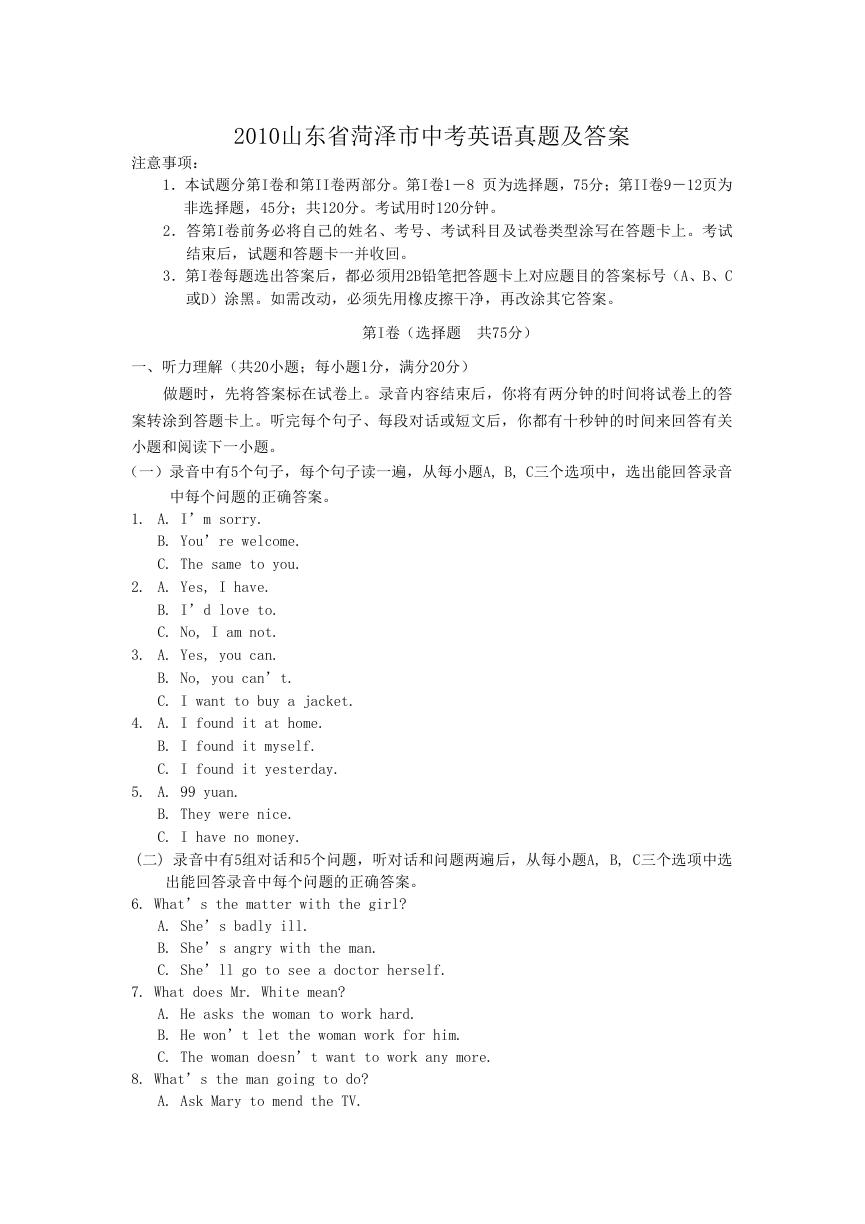

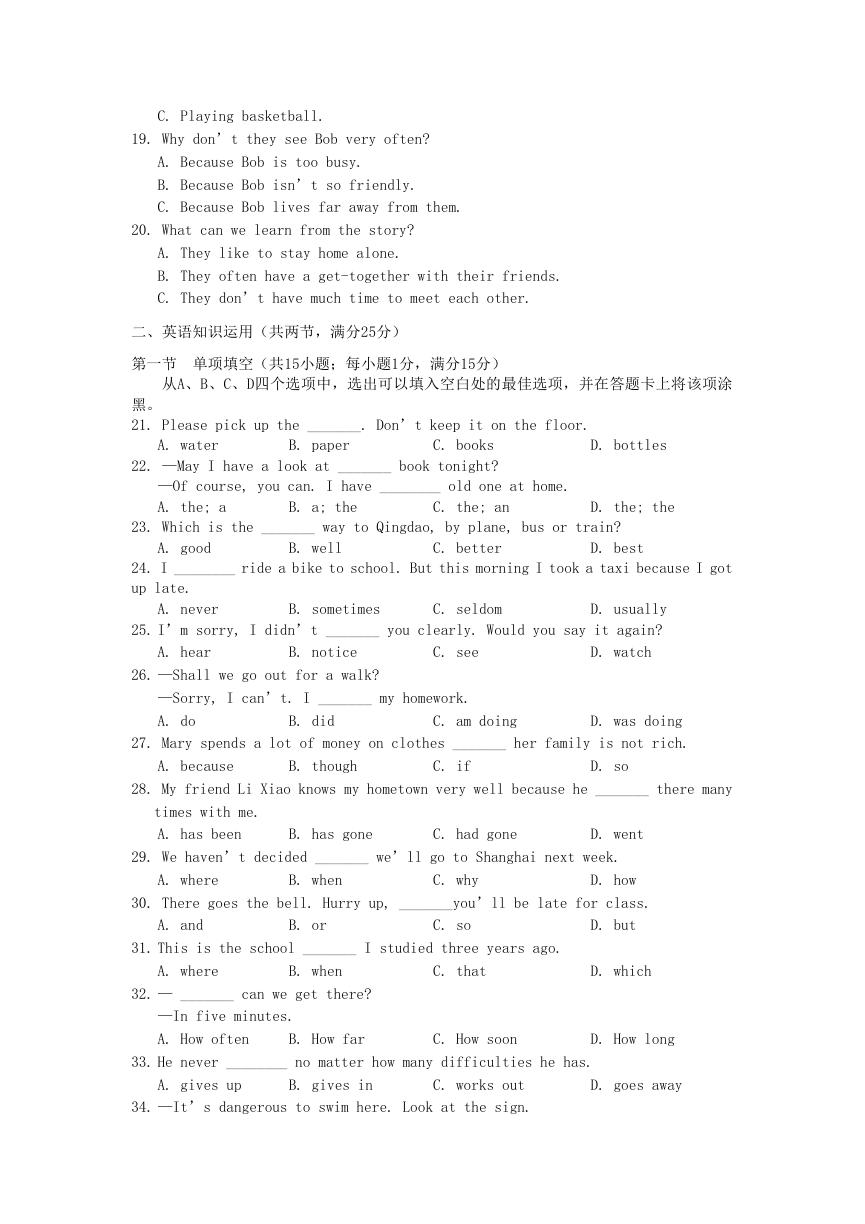
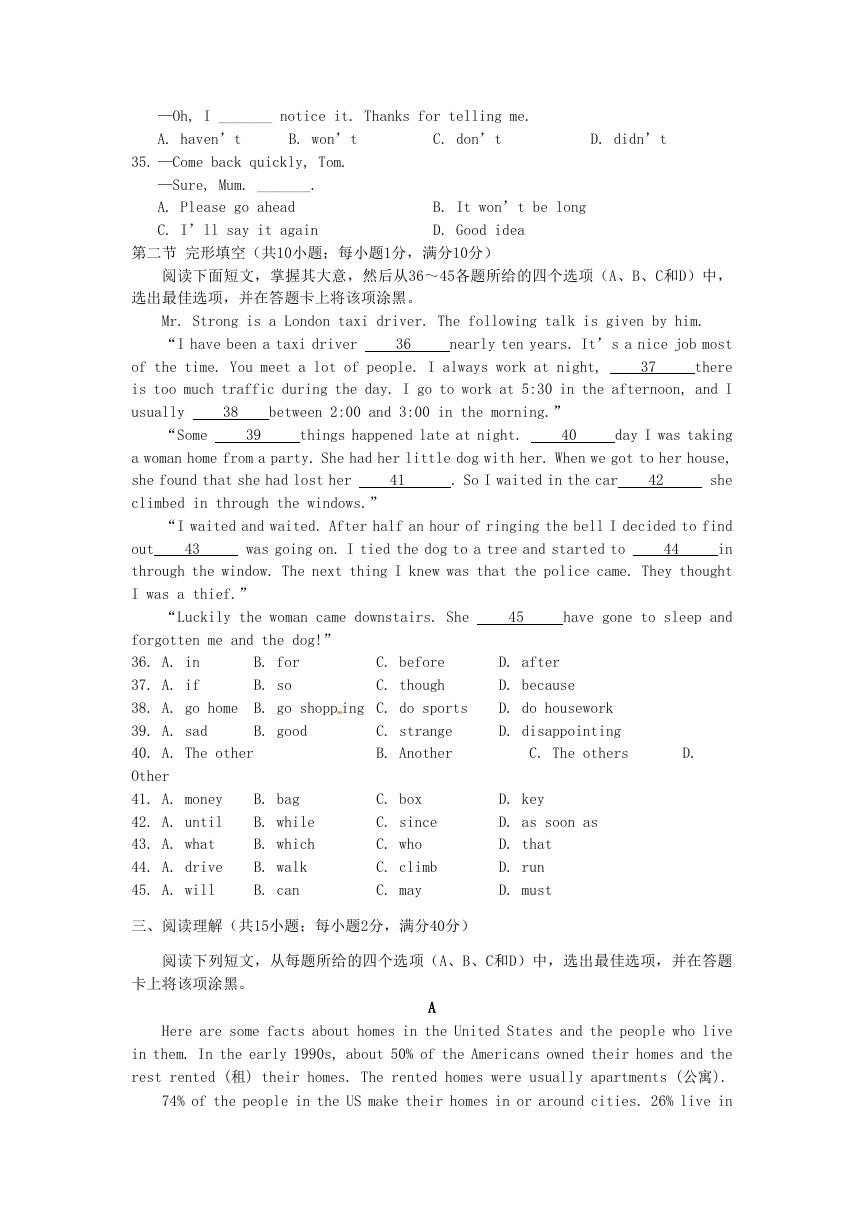
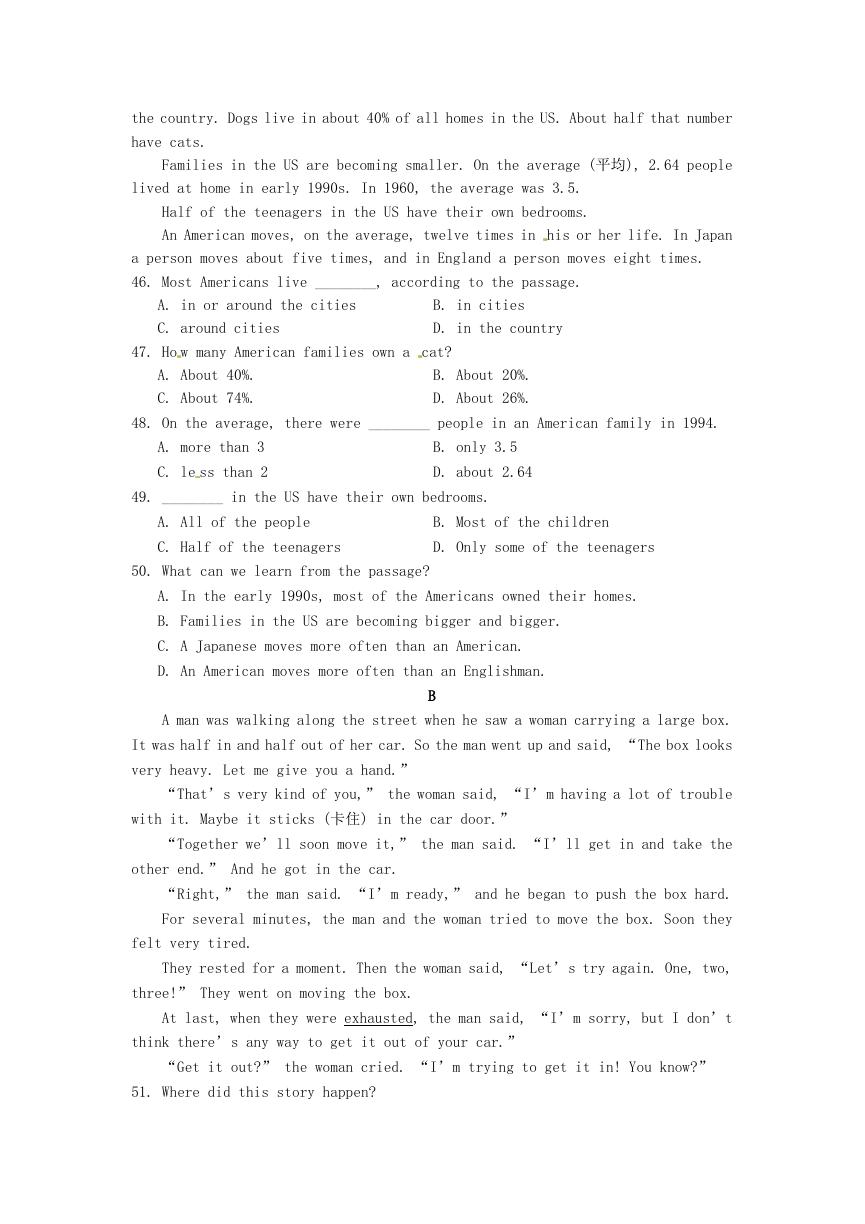


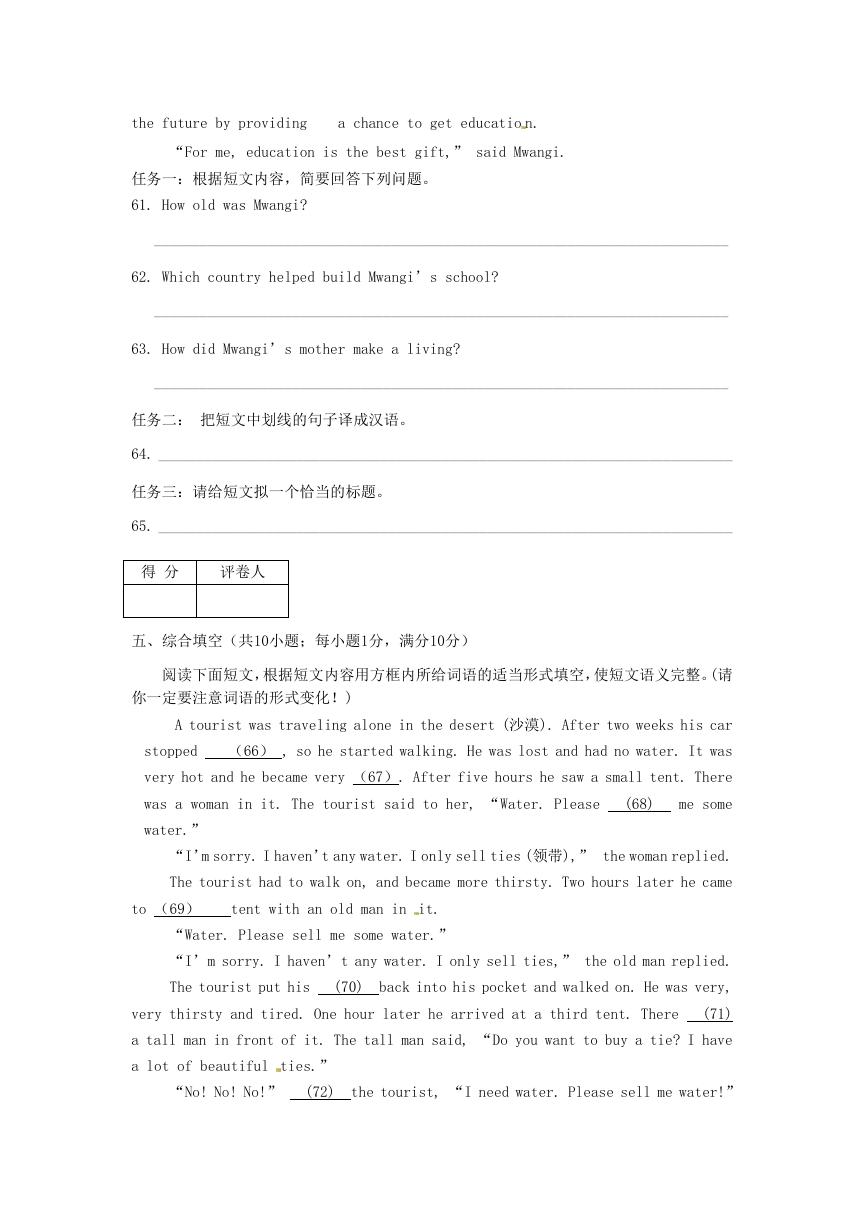








 2023年江西萍乡中考道德与法治真题及答案.doc
2023年江西萍乡中考道德与法治真题及答案.doc 2012年重庆南川中考生物真题及答案.doc
2012年重庆南川中考生物真题及答案.doc 2013年江西师范大学地理学综合及文艺理论基础考研真题.doc
2013年江西师范大学地理学综合及文艺理论基础考研真题.doc 2020年四川甘孜小升初语文真题及答案I卷.doc
2020年四川甘孜小升初语文真题及答案I卷.doc 2020年注册岩土工程师专业基础考试真题及答案.doc
2020年注册岩土工程师专业基础考试真题及答案.doc 2023-2024学年福建省厦门市九年级上学期数学月考试题及答案.doc
2023-2024学年福建省厦门市九年级上学期数学月考试题及答案.doc 2021-2022学年辽宁省沈阳市大东区九年级上学期语文期末试题及答案.doc
2021-2022学年辽宁省沈阳市大东区九年级上学期语文期末试题及答案.doc 2022-2023学年北京东城区初三第一学期物理期末试卷及答案.doc
2022-2023学年北京东城区初三第一学期物理期末试卷及答案.doc 2018上半年江西教师资格初中地理学科知识与教学能力真题及答案.doc
2018上半年江西教师资格初中地理学科知识与教学能力真题及答案.doc 2012年河北国家公务员申论考试真题及答案-省级.doc
2012年河北国家公务员申论考试真题及答案-省级.doc 2020-2021学年江苏省扬州市江都区邵樊片九年级上学期数学第一次质量检测试题及答案.doc
2020-2021学年江苏省扬州市江都区邵樊片九年级上学期数学第一次质量检测试题及答案.doc 2022下半年黑龙江教师资格证中学综合素质真题及答案.doc
2022下半年黑龙江教师资格证中学综合素质真题及答案.doc